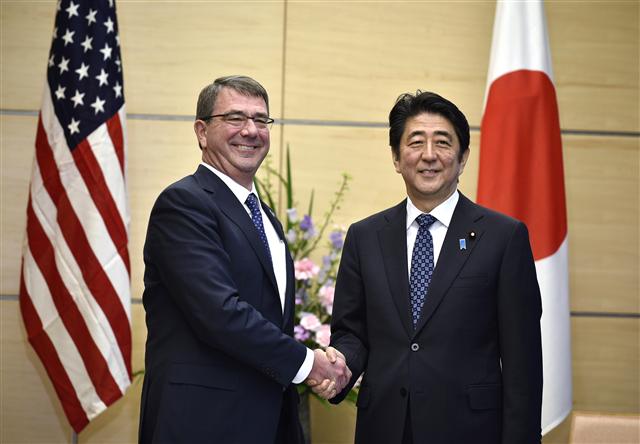Posted on : Apr.9,2015 17:31 KSTModified on : Apr.9,2015 17:31 KST
 |
US Secretary of Defense Ashton Carter (right) shakes hands with Japanese Prime Minister Shinzo Abe at the Prime Minister’s Residence in Tokyo, Apr. 8. (AP/Newsis) |
South Korea is finding itself caught in a two-pronged diplomatic dilemma. Already faced with a difficult balance between the US and China on the issue of a Terminal High Altitude Area Defense (THAAD) missile defense deployment, Seoul is now wedged in an awkward position in its trilateral relationship with an increasingly tight-knit Washington and Tokyo. Its failure to come up with a way out has many now accusing it of a diplomatic failure.
In terms of South Korea-Japan relations, the US has been tilting toward Tokyo’s position with increasing outspokenness. An interview with Secretary of Defense Ashton Carter published in the Apr. 8 edition of Japan’s Yomiuri Shimbun newspaper is being read as a call from the US for South Korea to stop dwelling on historical conflicts and climb on board soon with trilateral coordination.
“The statements coming from US authorities recently seem to reflect Washington’s ’honne,‘” said Kookmin University professor Lee Won-deok, referring to a Japanese term for “true intentions.”
“What they’re saying is that unpleasant as it may be for us, the US is focusing on its own interests,” Lee said. The message appears to be that the US, whose chief concern is building a trilateral coordination framework to counter China, is increasingly chafing with South Korea’s reluctance to come on board due to historical conflicts with Japan.
Tokyo, for its part, is positively brimming with confidence. Having taking advantage of its close ties with Washington to satisfy Prime Minister Shinzo Abe’s long dream of amending the US-Japan defense cooperation guidelines and recognizing Japan’s collective self-defense rights, it is now going into reverse again on historical issues with South Korea, as seen with its recently middle school textbook review and Diplomatic Bluebook ramping up territorial claims to Dokdo.
The problem for Seoul is that its diplomatic efforts are coming up short. To date, it has adopted a two-track approach in which issues of historical and territorial provocations from Japan are dealt with separately from security matters. Speaking at a meeting between the administration and the ruling Saenuri Party (NFP) on Apr. 8, Minister of Foreign Affairs Yun Byung-se defined Seoul’s task as “figuring out how to get through this while finding the right balance between the areas where we need to respond strongly to Japan and the ones where we need to cooperate.”
It’s an increasingly fine line to walk as public sentiments sour on Seoul turning a blind eye to increasingly intense provocations from Tokyo and focusing instead on security cooperation. An even tougher question is how to respond to strong pressure from Washington to join in on trilateral coordination. Another chief concern is that South Korea could face objections from China, its biggest trading partner, if it allows itself to get drawn into such a relationship.
Experts agreed on the need for a proactive diplomatic response, but disagreed along philosophical lines on the right direction and focus.
“If South Korea had taken the initiative earlier with its ’two-track approach,‘ it might have been able to achieve strategic and moral edges in relations with Japan,” said Asan Institute for Policy Studies vice director Choi Kang - suggesting the Park Geun-hye administration may have brought on the backlash from Tokyo and the cold shoulder from Washington by stressing historical issues too strongly in the early going.
Others stressed the differences among the THAAD, historical issues, and trilateral coordination issues, noting that THAAD is a case where Washington and Beijing are both trying to get Seoul on board with them, while the trilateral relations issue with the US and Japan stems from their pressure on South Korea to follow along with their choice. The argument from this side is that a role for Seoul in trilateral security cooperation requires a more forward-thinking perspective on historical matters from Japan - and that Washington should be encouraged to put more pressure on Japan to change its attitude on historical issues instead of siding with it.
Still another position is that South Korea should break free from its narrow approach to diplomacy with stronger counterparts. In particular, improved inter-Korean relations are being singled out as a possible way toward fixing the diplomatic dilemma from a broader perspective.
“If relations with North Korea improve, Japan is no longer such a big security variable,” said Yonsei University professor Moon Chung-in.
“Not only can we voice our side more strongly on historical matters, but we can also stand tall under pressure from the US,” Moon suggested.
By Kim Oi-hyun, staff reporter
english.hani.co.kr/arti/english_edition/e_international/686161.html




